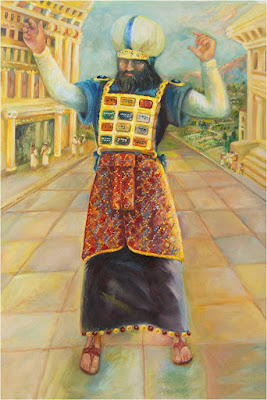by Rav Dov Lior, yeshiva.co, translated by Hillel Fendel
This week's weekly Torah portion of Tetzave tells us of the choice of the Kohanim – the Priests – and how they are to be prepared for their service in the about-to-be-built Tabernacle (Mishkan). Most of the attention in Tetzave is centered around the special garments they are to wear during the service.
The portion actually starts out with two verses discussing the oil for the Menorah (lamp) in the Mishkan. It must be "pure beaten olive oil," and the lamp must burn perpetually in the Tent of Meeting. The commentators ask: What are these verses doing here in the portion dealing with the choosing and preparation of the Priests? Why are they not in the passage of the Menorah?The answer is that our holy Torah revealed to us here the great virtue of the Torah, called Torat Moshe, the Torah of Moshe Rabbeinu. How so?
Two utensils in the Tabernacle alluded to the light of Torah. One was the Ark that housed the Tablets of the Covenant. The Ark represents the Written Torah, as well as Israel's acceptance of the Oral Torah from teacher to student through the generations. The second utensil was the Menorah, which stands chiefly for the idea of innovative Torah thought and investigative study. This was also given to Moshe, and he transmitted this power to the generations afterwards. The light that shines from the strength of the Menorah represents the power of the Sages of Israel to be innovative in Torah and to derive laws from the verses in accordance with the specified "Hermeneutical Rules."
By writing about the Menorah in the portion that discusses the Priesthood, the Torah is telling us that the Priesthood and the Divine Service are on a level close to that of the Torah itself. Parshat Tetzave opens with the Menorah and its oil – i.e., the Torah – and then immediately afterwards discusses the greatness of the Priesthood. This is why Moshe is told here, "Bring them – the Kohanim – close to you" (Sh'mot 28,1); they are coming close to Moshe, who stands for the Torah.
The choice of Aharon, Moshe's brother, to be the High Priest is not because of his talents or deeds. Rather, from the very beginning of Creation, his soul was designated for the Priestly service. And when Korah later came around and led a rebellion with the claim that the Priesthood was to be assigned based on character traits, God made it clear to all that this was an act of Creation that can never be changed.
Nowadays as well, though we do not have the Holy Temple Service, the Kohanim retain a unique sanctity, and special commandments apply to them: They may not be defiled by the impurity of death (they many not enter a cemetery, etc.), and they must not marry certain women. In addition, the non-Kohanim amongst us are required by Biblical law to honor Kohanim in specific ways, such as not to take advantage of them, to give them the first Aliyah to the Torah, etc.
However, the primary aspect of safeguarding the status of the Priesthood is in preparation for the future. We anticipate that the day is near when the Nation of Israel will return to its Land with full strength, and will merit to build the Holy Temple and renew the Divine Service there. It is therefore important that the Priests should begin preparing for this! For this purpose, the Chafetz Chaim – author of the Mishna Berurah, died in 1933 – compiled a set of laws for Kohanim. He wrote it in the style of the Rif, extracting the laws from the Mishnaic order of Kodashim. And thank G-d, we have merited in our day to see several Kollelim dedicated to this topic and to these laws, which are studied there in depth just as the orders of Nashim and Nezikim are studied in the mainstream yeshivot.
Just as we request every day in our prayers that G-d's presence should return to Zion, so too we must act to advance the Temple service. We must encourage in our Priests the willingness to serve Israel in this manner, while we, for our part, will learn to honor and aggrandize them as in yore – until we merit to see G-d's salvation and the building of the Beit HaMikdash, speedily in our days.

No comments:
Post a Comment